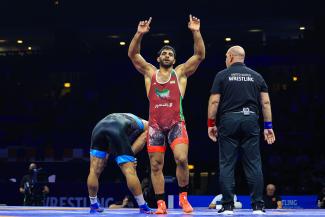WADA Launches ‘ALPHA’ and ‘Coach True’ Certifications for Wrestling Community
Friday, July 17, 2020 - 01:13 By United World Wrestling Press

CORSIER-SUR-VEVEY, Switzerland (July 17) – Without opportunities to compete on the mat, hundreds of top wrestlers and coaches have made the best of their recent downtime and earned certificates delivered through the World Anti-Doping Agency's (WADA) educational tools, ALPHA and CoachTrue.
These educational programs are made available to all athletes and coaches by WADA via the e-learning platform ADeL. The programs intend to provide education and information about the dangers of doping, and the importance of anti-doping controls. They also provide solutions for clean progression in sport rather than simply focusing on what is not allowed.
In the framework of its anti-doping education program, United World Wrestling selected 500 wrestlers from 50 countries and around 150 coaches from 41 countries via their national federations and requested them to complete these programs. Participants who complete all sections of the course, as well as the post-course and the final exam, earned a certificate from WADA.
The wrestlers included those who have already qualified a place for the 2020 Tokyo Games as well as several top-ranked Junior and Senior level wrestlers from countries with a higher risk of doping. That risk was based on an assessment which considered several factors (rank, track record of positives in a country, number of tests collected).
UWW will gradually request all wrestlers and coaches planning to enter a major event (Games, World Junior and Senior championships) to hold their respective certificate (or a recognized equivalent delivered by a National Anti-doping Organization) as a pre-requisite for attending. This has already been successfully implemented in past regional events.
The program also exists for medical professionals such as sports physicians, physiotherapists or sports nutritionists. UWW will extend the requirement to this population so that the athletes’ entourage become more knowledgeable and learn about their role in protecting clean sport.
UWW encourages all wrestlers and wrestlers’ entourage not yet selected to proactively take the course.
Click here to access the platform.


Share your thoughts.
Comments